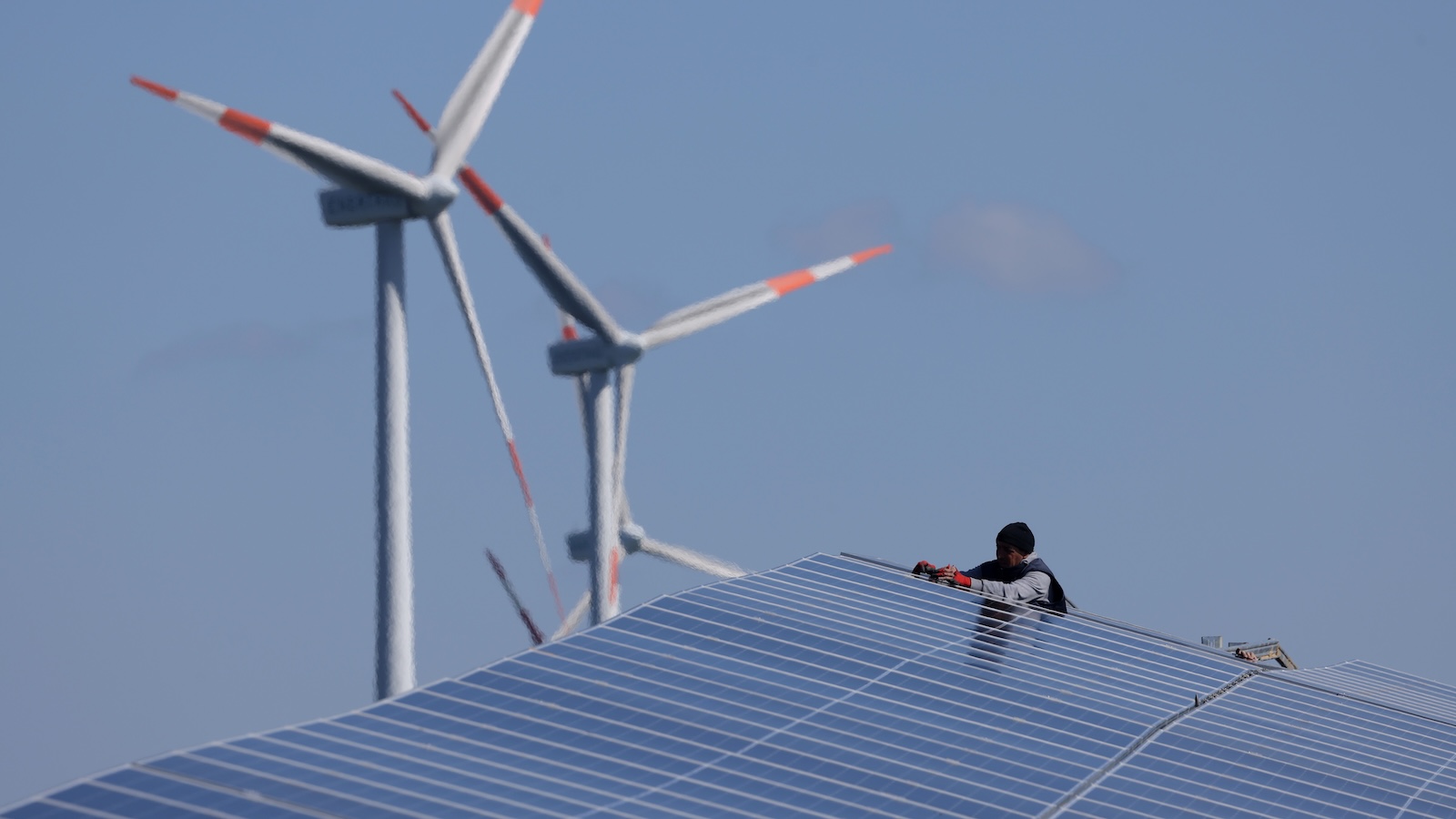A “green backlash” helped conservatives win in Germany. What happens now?
May 7, 2025
In February, Germany held an election that had many echoes of the one America held in November. Voters were incensed with inflation — especially electricity prices, which surged 80 percent after Russia invaded Ukraine and never returned to normal. Right-wing parties channeled that fury toward the incumbent government’s green policies, including the pioneering Energiewende decarbonization plan that has made renewable energy more than half of the electricity Germans use today.
While President Trump has promised to stifle clean energy and bring a fossil-fuel renaissance to the United States, Germany isn’t going that route. On Tuesday, Friedrich Merz of the Christian Democratic Union was sworn in as chancellor, leading a new conservative government in Berlin. It has laid out policies that decelerate, but don’t reverse, the country’s blistering renewables buildout, while easing up on the decarbonization push in buildings and industry.
Reader support makes our work possible. Donate today to keep our site free. All donations DOUBLED!
The goal: Quickly reduce bills for households and businesses and reinvigorate the economy. Merz says German economic policy has been “almost exclusively geared toward climate protection,” according to Politico. “I want to say it as clearly as I mean it: We will and we must change that.”
Historically, Europeans have been willing to shoulder the higher costs of aggressive climate and energy policies. But after three years of war in Ukraine, energy prices remain elevated — with household electricity rates still one-third above their pre-war levels — frustrating consumers and raising fears of industrial collapse. European companies face electricity costs 2 to 3 times that of the U.S. and natural gas prices 4 to 5 times higher.
Elections across the continent last year featured a “green backlash.” Politicians focused on voters’ biggest complaints — migration, the cost of living, a stagnant economy — and ignored climate. Dutch farmers revolted against a law to reduce air pollution; the Italian far right railed against a coming ban on conventional cars.
However, few interpret these developments as Europeans wanting to ditch the energy transition. In Germany, businesses say the Energiewende needs permitting and regulatory reforms and a greater focus on cost efficiency, not “a chainsaw.”
Michael Stiefel, a policy officer on people experiencing poverty with Diakonie Deutschland who advocates on behalf of low-income households, including those burdened by energy costs, says he never hears anyone express climate skepticism or opposition to clean energy. “Their main aim is to get to a minimum standard for their own lives,” he said. “A higher living style which would be stable and sufficient.”
The Energiewende dates to the 1990s, when German leaders resolved to decarbonize the economy, starting with the grid. The plan was to transition from a power system centered on coal and nuclear power to one based on renewables – with natural gas being recruited later as an interim fuel. Germany lacks domestic gas reserves and relied heavily on Russia, which provided 40 percent of the European Union’s imported gas in 2021. Germans financed the wind and solar buildout through surcharges on utility bills.
The program has remade the German power mix. About 22 gigawatts of coal and nuclear have been retired just since 2020, clearing the way for renewables’ surge. The power grid’s transformation is the main reason Germany’s emissions have fallen by half since the 1990s.
After invading Ukraine in 2022, Russia sharply reduced gas shipments to Europe, and electricity and fuel prices skyrocketed. In Germany, where three-quarters of buildings are heated by gas or oil, people shivered: In 2022, 5.5 million Germans felt they couldn’t afford to keep their homes warm.
Europe’s painful lesson: An energy transition without energy security is risky.
“Energy in my opinion is very geopolitical, and you always have to strive toward diversifying your energy resources,” said Kesavarthiniy Savarimuthu, who leads the European Power Markets team at BloombergNEF. “Somewhere along the line, it just seems like Europe forgot it was building its reliance on a sleeping bear.”
Germany has replaced most of its Russian gas with fuel from friendlier, if pricier, sources in Europe and the U.S. It also used the war as motivation to accelerate solar and wind buildouts: In 2021 it built 5.7 gigawatts of solar; in 2023 it added about 15 GW. But with 2.2 percent inflation still burdening many Germans, right-wing and far-right politicians had no trouble campaigning against the incumbent, center-left government last year. Merz called wind turbines “ugly” and promised policy “for the majority who can think straight … and not for any green and leftwing nutcases.”
In April, Merz’ party announced a coalition with other governing partners and laid out its policy plan for the next five years. Some climate advocates read the blueprint with relief, as it stopped short of torching many of Germany’s long-term climate targets, such as achieving net-zero by 2045 and phasing out coal by 2038.
Merz says his guiding light for energy policy is not climate but “competitiveness.” Taxes and fees on power bills are part of why Germans have some of the most expensive electricity in Europe, according to the International Energy Agency. The new coalition promises to ease these charges so electricity rates drop at least 5 euro cents per kilowatt-hour; that’s about an eighth of the rate the average German household currently pays.
The coalition agreement says it wants to keep developing all renewable energy sources, but with an emphasis on compatibility with the grid. Power companies have complained that in the rush to hit its renewables targets, Germany has often built solar and wind farms in remote or hard-to-reach places, resulting in higher costs. Geographic mismatches — for example, brisk wind energy in the north not being able to reach customers in the industrial south — mean that electricity prices can spike in one region even as they go below zero in another.
More controversially, the new government has proposed building 20 gigawatts of natural gas generation by 2030; the whole German power system stands at about 260 GW. Solar and wind are now the cheapest energy sources in most of the world, but they’re still prone to wild swings in productivity — in December, Germany’s wind output fell 85 percent below normal. Merz is sympathetic to energy-industry arguments that new gas plants can mitigate such eventualities. He’s also proposing to clear red tape for energy storage, which plays a minimal role today but could theoretically serve the same balancing role.
A likely target of the Merz government is the country’s building energy law, which outlaws most new fossil-fuel heating systems in buildings starting in 2028. Inflation has left many people unable or unwilling to pay the up-front costs for electric systems like heat pumps — an unpopularity that conservatives exploited in the campaign.
So what, if anything, can be learned from Germany’s experience?

Sean Gallup / Getty Images
Renewables are cheap, but bills often don’t reflect that
In principle, renewable energy should lower electric bills. Solar and wind are inexpensive to build, and their fuel is free.
In practice, the savings often don’t reach consumers. Ratepayers must cover the cost of integrating renewables into the grid, paying for new transmission lines and the backup systems needed to balance nature’s flutters. Conservatively, Germany needs to invest 500 billion euros (about $565 billion) over the next two decades just to upgrade the power grid, estimates Deutsche Bank. These should be one-time investments, but during inflationary times, it’s understandable if people wonder what they’re paying for.
Worse, many European countries that have greatly expanded renewable energy, including Italy, Spain, Portugal and Germany, nevertheless tend to base power rates on the price of gas. A recent report on European competitiveness said this is a structural flaw, arguing countries should reform pricing so consumers benefit more directly from clean energy.
Green energy is cheap…eventually
The good news: Both the U.S. and Europe have made significant headway in decarbonizing their power sectors. The bad: The transportation, buildings, and industrial sectors remain, and the alternative technologies are much less mature. The sticker shock associated with electric cars, hydrogen furnaces, and heat pumps contributed to last year’s green backlash in Europe.
Still, energy experts argue that electrifying more of the economy eventually lowers costs overall. “If you do this you can really go to a very sustainable, pretty cheap and high-performance energy system. That’s actually the goal,” said Gunnar Luderer, who leads the Energy Transition Lab at the Potsdam Institute for Climate Impact Research.
He said China is moving in this direction. For example, it recently launched a pilot project in nine cities to see if their growing fleets of electric cars can provide battery storage for the system. Recent trends in the Western world raise the question of whether voters are willing to make these kinds of investments.
Ignore social impacts, risk green backlash
In Germany, buildings have to pay a carbon tax that rises over time. Germany’s previous government promised to create a fund to help citizens manage these price increases — to the tune of several hundred Euros per year — but cut it for budget reasons, leaving the public with all stick and no carrot. Europeans remain broadly supportive of their governments’ climate policies, but it’s “increasingly clear that this support could fade if the transition is not fair and citizens are left to shoulder the costs on their own,” said a recent report by E3G, a think tank.
While some governments have sent money to households during crises to help them pay bills, others are tackling the issue at a deeper level. E3G said Bulgaria, Croatia, Italy, Denmark and Poland have all expanded incentives to make homes more energy-efficient — which could not just save citizens money, but help them weather the next crisis.
Search
RECENT PRESS RELEASES
Related Post




